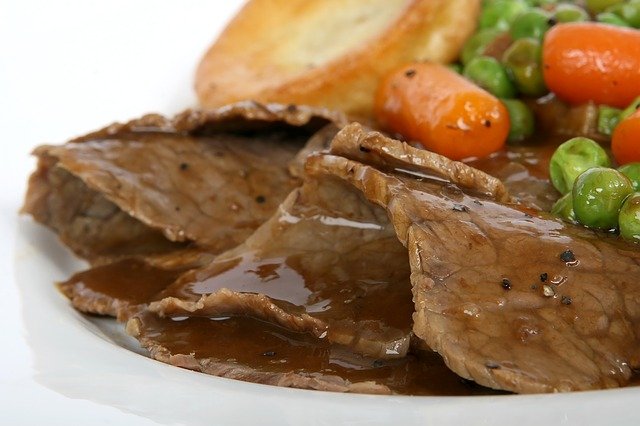
Ever wonder if you can freeze cooked roast beef and gravy?
Well, you’re not the only one. Many people asked this question many times.
In fact, I asked the same question before. So I decided to give it a try.
What I found is that you can freeze cooked roast beef and gravy. You can combine the cooked roast beef and gravy in an airtight container and freeze them for 1-3 months.
It is important to remember though that the shelf life of cooked roast beef and gravy depends on how they are handled.
If done properly, roast beef and gravy can last in the freezer for a couple of months safely.
How to freeze cooked roast beef and gravy?
To freeze cooked roast beef and gravy, you first need to cool them down.
This is important because hot foods release air as they cool, and that can change the consistency of your gravy from what you expect when reheating it later on.
Transfer cooked roast beef and gravy into a shallow container, put in the refrigerator until it’s half cooled down.
Then place the container inside the freezer for 1-3 days before transferring them to a freezer bag or an airtight plastic container with all their original juices to expand the surface area (this helps it freeze faster).
This then returns to the freezer. Do not fork over.
Remember to press any air pockets out before sealing the bag or container.
It is best if you wrap them well with aluminum foil so that there will be no leakage.
It is also best to use freezer bags or containers with tightly fitting lids for the same reason.
How long can you freeze cooked roast beef and gravy?
The shelf life of cooked roast beef and gravy in the freezer depends on how well they are handled, and how fresh it is before freezing.
Generally, if done properly, it can last for 3 months at -18 degrees Celsius (-0.4 F).
You need not worry about your meat if it has already been frozen since it is packed as soon as possible after being cooled down by half.
Sealing them airtight helps keep the foods’ natural flavors inside the package until you get around to reheating it all up later on.
This will facilitate the food’s reheating process, as well as its delivery to your stomach.
What to remember when freezing cooked roast beef and gravy?
It is important to remember that the best way to freeze food is in vacuum-sealed materials or containers.
This helps you avoid freezer burn, which happens when air gets into frozen foods and dehydrates them.
As a result, they end up dry and tasteless; not something anyone wants after going through all the trouble of freezing it.
So always seal cooked roast beef and gravy tightly with plastic wrap because this keeps moisture from evaporating too fast once the lid goes on.
If you want to be sure there’s no air left inside, try vacuuming out any trapped spaces (check my recommended vacuum sealer on Amazon) especially if you’re stuffing it into an already full freezer bag.
What are the benefits of freezing cooked roast beef and gravy?
Freezing cooked roast beef and gravy is one of those things that make life a whole lot easier.
It saves you from having to cook every time you’re hungry, or having to spend money on take-out meals.
All you have to do is heat it up in the microwave for a few minutes, then sit back and enjoy a delicious meal – without spending any more than 5 minutes making it.
Pretty handy if I say so myself!
Another advantage of cooking large batches of foods like this is that they last longer than smaller portions would (i.e., an extra month’s worth).
This also gives you plenty of opportunities to experiment with new recipes while you wait for your first batch to run out.
How to thaw cooked roast beef and gravy?
For an easy way out, where you can skip the whole cooking process by reheating your food is through a microwave defrosting.
This will deliver your meat at room temperature or even warm up your meal for a fraction of the time it would take to cook again from scratch.
You just need to defrost in the refrigerator overnight, or on the countertop at room temperature for several hours.
Remember not to cover with plastic wrap while defrosting because this will trap condensation that may cause the surface of your meat to get soggy.
What can you do with cooked roast beef and gravy?
If you thaw out the frozen roast beef and gravy for a couple of hours in the refrigerator before cooking, then it is perfectly fine for use.
If you decide not to cook them now, consider storing them back in the freezer once you are done serving them to your family members.
This way reheated cooked roast beef and gravy should taste as fresh as it was from the oven!
Another thing that you may want to remember is not to place too many cold items on top of or around this one, because they can possibly cause moisture formation again inside your container.
Instead, reheat the cooked roast beef and gravy, then put them back in the freezer if you don’t think that they will be consumed with relative frequency.
Reheating cooked roast beef and gravy
Finally, learn how to properly reheat your cook roast beef and gravy.
To do this:
Bake or microwave on high for 2-3 minutes (for a single serving) or 4-5 minutes (for multiple servings). Stir occasionally.
A stovetop is also possible but requires more attention due to safety issues.
Keep it away from heat once thawed out.
Cover it while cooking until hot; stir frequently.
Reheat in saucepan or casserole dish covered with a lid until bubbly (about 20 minutes).
If you want to reheat it the next day, stir occasionally while microwaving (for a single serving) or every 5 minutes until hot (when reheating multiple servings).
You may also reheat your roast beef and gravy by way of a frying pan or skillet.
If you ever want to soak the gravy, make sure that this is at room temperature while you are cooking it.
The same goes for when you want to cook your roast beef.
It should be thawed but not frozen all over again.
Final Thoughts
If you have gotten at this section of the post, you should know by now that you can freeze cooked roast beef and gravy.
Just make sure that you do everything properly.
Before freezing, make sure that the food is completely cooled to room temperature.
This will help preserve the freshness of the meat.
All issues arising from heating cooked roast beef after freezing should be resolved if these recommendations are followed closely.
I hope this post helps you store your leftover cooked roast beef and gravy.
If you want, you can learn more about freezing foods here.

